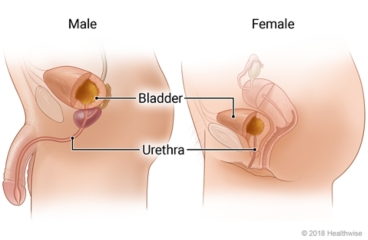
Your Recovery
Urethral dilation is a procedure to stretch the sides of the urethra. The urethra is the tube that carries urine from your bladder to outside your body. Sometimes scar tissue narrows the urethra. This is called urethral stricture.
When the urethra is narrow, it's hard for urine to pass through and out of your body. Dilation often can relieve symptoms by widening the urethra.
To open the narrowed part, the doctor used one or more thin tools to stretch the stricture. The doctor then may have placed a thin, soft tube (catheter) in the urethra to drain urine and to keep the urethra open. The catheter is removed after a few days. After dilation, urine should be able to pass more freely from your bladder.
Your doctor may have shown you how to do dilation at home.
After dilation, your urethra may be sore at first. It may burn when you urinate. You may feel the need to urinate more often, and you may have some blood in your urine. These symptoms should get better in 1 or 2 days. You will probably be able to go back to most of your usual activities in 1 or 2 days. Drink extra water for the next few days.
This care sheet gives you a general idea about how long it will take for you to recover. But each person recovers at a different pace. Follow the steps below to get better as quickly as possible.
How can you care for yourself at home?
 Activity
Activity
- Rest when you feel tired.
- Be active. Walking is a good choice.
- Ask your doctor when you can drive again.
- You will probably need to take 1 to 2 days off from work. It depends on the type of work you do and how you feel.
- Ask your doctor when it is okay for you to have sex.
 Diet
Diet
- You can eat your normal diet. If your stomach is upset, try bland, low-fat foods like plain rice, broiled chicken, toast, and yogurt.
- If your bowel movements are not regular right after dilation, try to avoid constipation and straining. Drink plenty of water. Your doctor may suggest fiber, a stool softener, or a mild laxative.
 Medicines
Medicines
- Be safe with medicines. Take medicines exactly as prescribed. Call your doctor if you are having a problem with your medicine. You will get more details on the specific medicines your doctor prescribes.
- If you take aspirin or some other blood thinner, be sure to talk to your doctor. He or she will tell you if and when to start taking this medicine again. Make sure that you understand exactly what your doctor wants you to do.
Follow-up care is a key part of your treatment and safety. Be sure to make and go to all appointments, and call your doctor if you are having problems. It's also a good idea to know your test results and keep a list of the medicines you take.
When should you call for help?
Call 911 anytime you think you may need emergency care. For example, call if:
- You passed out (lost consciousness).
- You have chest pain, are short of breath, or cough up blood.
Call the doctor now or seek immediate medical care if:
- You have pain that does not get better after you take pain medicine.
- You cannot pass urine.
- You pass blood clots in your urine.
- You are too sick to your stomach to drink any fluids.
- You have symptoms of a urinary tract infection. These may include:
- Still having pain or burning when you urinate about 2 days after the procedure.
- Pain in the flank, which is just below the rib cage and above the waist on either side of the back.
- Still having blood in your urine about 2 days after the procedure.
Current as of: April 9, 2025
Author: Ignite Healthwise, LLC Staff
Clinical Review Board
All Ignite Healthwise, LLC education is reviewed by a team that includes physicians, nurses, advanced practitioners, registered dieticians, and other healthcare professionals.

